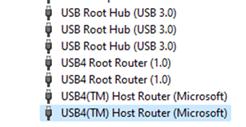Windows 11 includes a built-in notification system to support full USB Type-C functionality. This feature delivers alerts related to connection issues, suboptimal charging performance, and incompatible accessories. These notifications depend on precise hardware configuration at the firmware level.

The correct operation of these alerts requires accurate ACPI-based port identification. If notifications fail to appear, the root cause often lies in incorrect or absent ACPI descriptors. Specifically, a port must be properly marked as accessible to users and correctly identified as a USB Type-C interface. Mislabeling a port, such as classifying a Type-A connector as Type-C, or designating a visible external port as internal may disable notifications entirely.
Advertisеment
OEMs must ensure that all USB ports are validated through the Windows Hardware Lab Kit (HLK). The implementation of two key ACPI methods is mandatory: _UPC (USB Port Capabilities) and _PLD (Physical Location of Device). Verification should include testing under diverse conditions such as low-power chargers, active hubs, and varying cable types.
For platforms requiring enhanced security, OEMs may implement policies to restrict data transfer over USB Type-C in untrusted environments. Such restrictions must apply exclusively to externally exposed ports and must not affect internal peripherals like keyboards or touchpads. A user-controlled toggle for data disablement is recommended.
In 2023, Windows 11 gained native support for USB4, including a dedicated settings interface for managing USB4 devices and associated hubs. By January 2024, support was extended to USB4 Version 2.0, enabling maximum data rates of up to 80 Gbps via USB Type-C connectors.
To maintain compliance, OEMs should conduct a full audit of ACPI descriptors and the Device-Specific Method (_DSM) across all USB ports. Testing must cover all supported configurations. Coordination with the Microsoft Windows Hardware Compatibility Program (WHCP) is required before platform release. Any deviations from standard behavior must be documented clearly and accurately.
Support us
Winaero greatly relies on your support. You can help the site keep bringing you interesting and useful content and software by using these options:
